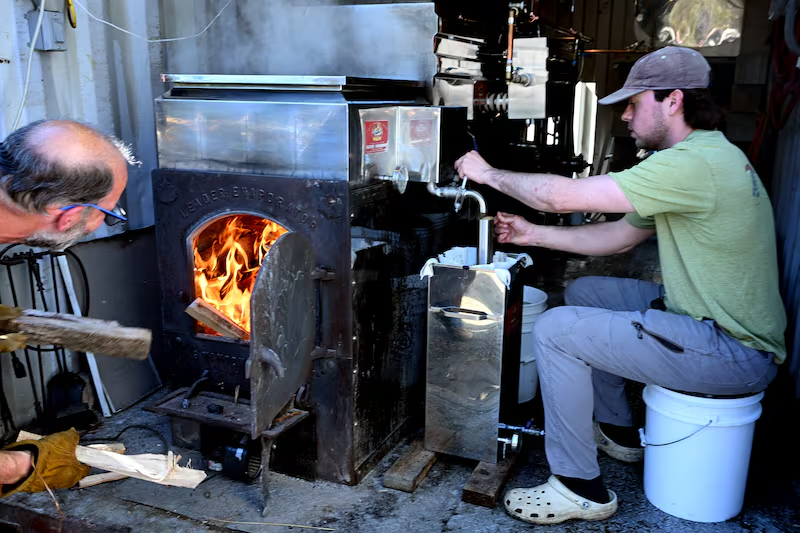
By Rita Giordano, Philadelphia Inquirer, Published March 4, 2025
As a girl growing up in New Jersey, Judith Vogel learned early that there never was a waffle that couldn’t be improved by a scoop of ice cream and a glorious drizzle of pure maple syrup.
Now a professor with Stockton University, Vogel is on a mission for Jersey kids of all ages to know that same real maple joy — thanks to none other than their own Garden State trees.
Welcome to the Stockton Maple Project, a plucky effort to prove that along with the state’s legendary tomatoes, world-class sweet corn, and up-and-coming oysters, maple syrup can indeed become the latest — although unlikely — example of South Jersey’s bounty.
“We’re going to really be looking at the idea of marketing maple syrup to the South Jersey consumer,” said Vogel, a math professor, who has partnered with like-minded professors in other disciplines. “It’s not a part of our culture.”
The Stockton Maple Project has been working toward changing that. Begun about five years ago, the project has received three U.S. Department of Agriculture grants totaling close to $1.5 million. Its earlier efforts were focused on production, research, and education. To be sure, real maple syrup is more thought of as the nectar of the northlands — Canada, the world’s largest producer, Vermont, and other New England states. Can the good stuff come from trees growing in the sandy soil of South Jersey? The Stockton folks say, you bet!
Still, South Jersey isn’t at first blush prime maple syrup country for a number of reasons. Unlike the large number of sugar maple trees in those northern states like Vermont, the nation’s largest maple syrup producer, South Jersey, including Stockton’s 1,600-acre main campus, primarily has red maples which have a lower sugar content. (The exception is a small satellite of the project at Batsto Village, a historic site in Wharton State Forest, which taps the sap of its resident sugar maples.)

By working in small batches and producing a more concentrated syrup, Vogel said they can create a product that has an even slightly higher sugar content than the Vermont standard. The project’s production is quite small compared to other states, but it has continued to grow. This year, they tapped 600 trees, up from 400. Last year, they made about 60 gallons of syrup. This year, she said it could reach 80 or more.
Some of that growth has been helped along by a growing partnership with a Vermont maple producer, Sunnymede Farms. Rather than view the fledgling South Jersey maple syrup maker as competition, Stockton’s Vermont partner sees this as a mutually beneficial opportunity to spread the love of maple to new consumers.
Promoting any domestically produced maple syrup is one of the goals of Stockton maple’s most recent federal grant. The South Jersey project can only produce so much syrup. If folks in our area get to prefer real maple over the fake stuff, Vermont producers will have an expanded market.
Related stories:
Maple syrup from New Jersey: You got a problem with that?
Stockton University’s maple syrup project is growing
If you like this post, you’ll love our daily environmental newsletter, EnviroPolitics. It’s packed daily with the latest news, commentary, and legislative updates from New Jersey, Pennsylvania, New York, Delaware…and beyond. Please do not take our word for it, try it free for a full month


